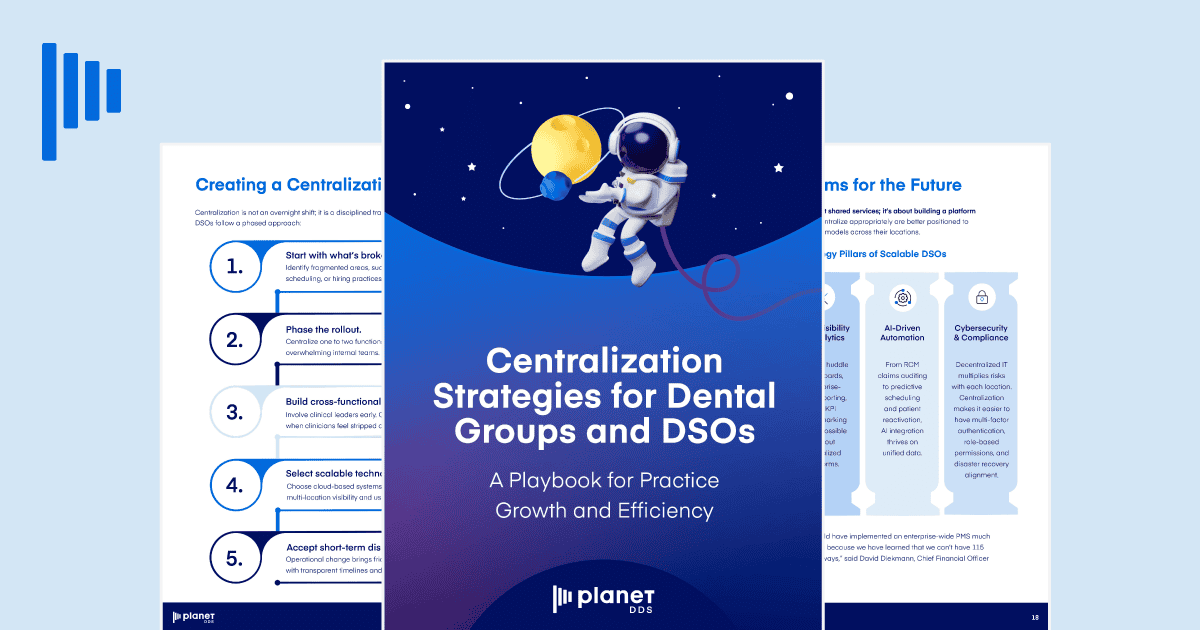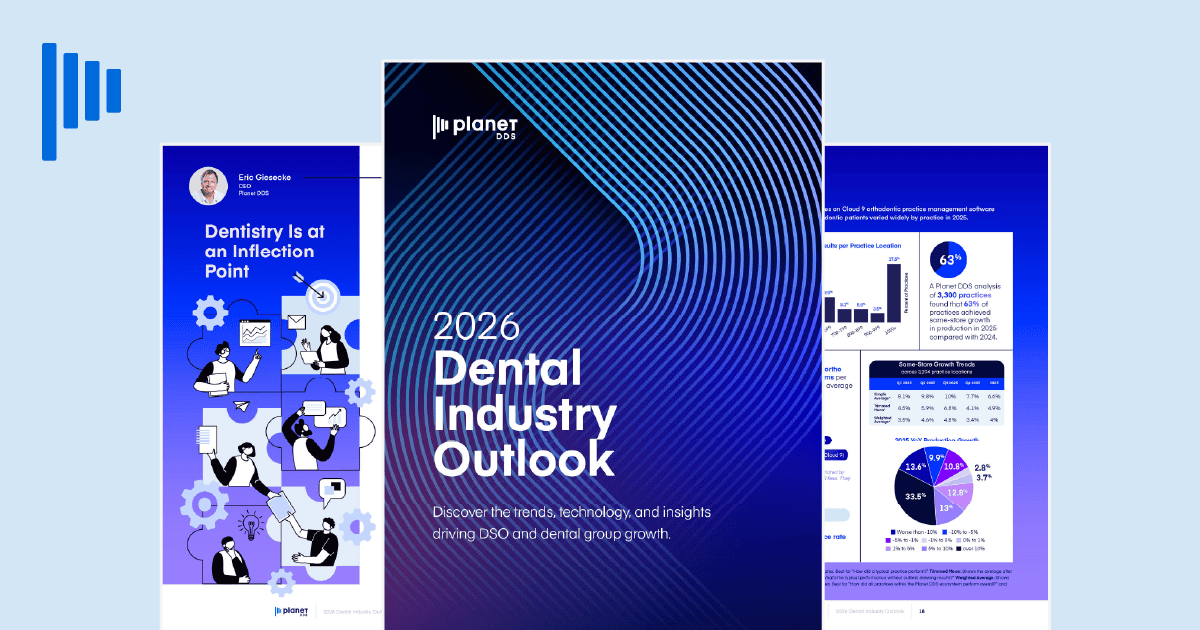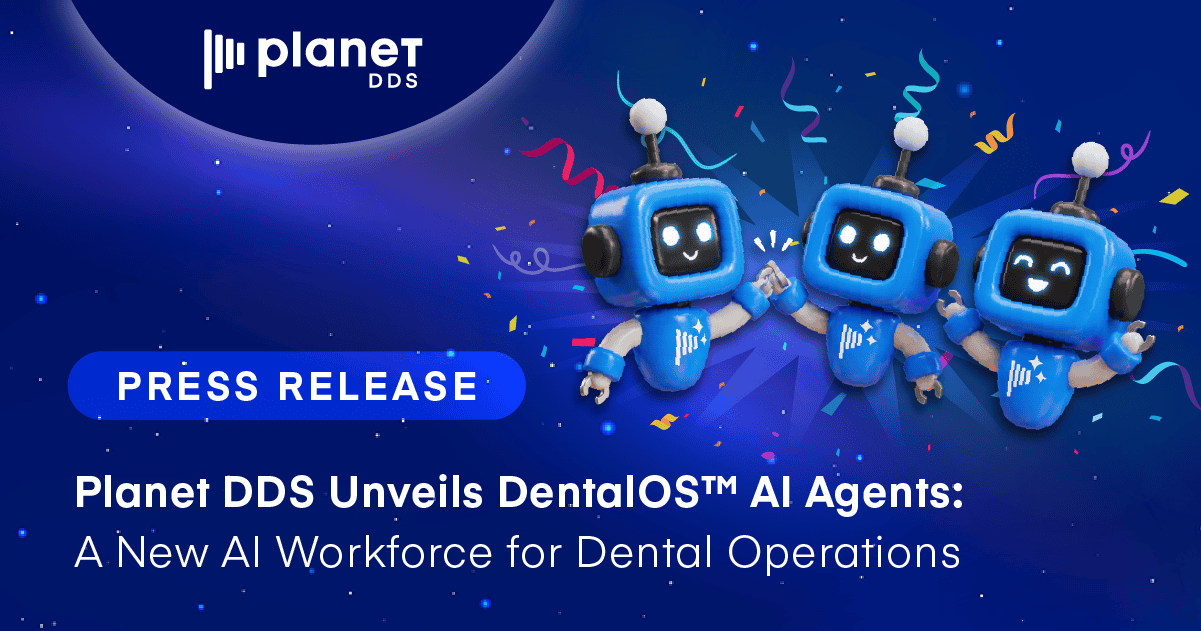Centralization Strategies for Dental Groups and DSOs

As dental groups and dental support organizations (DSOs) grow, maintaining operational consistency across multiple locations becomes increasingly complex. Centralization offers a proven framework for unifying critical business functions, creating visibility across the organization, and positioning teams for sustainable growth.
Centralization Strategies for Dental Groups and DSOs: A Playbook for Practice Growth and Efficiency, shows how leading organizations are rethinking operations to improve efficiency, align teams, and strengthen performance across every location.
Discover practical steps, expert insights, and real-world examples for building a centralization roadmap tailored for your DSO or dental group.
Why Centralization Matters
Centralization has become essential for fast-growing dental organizations. By unifying operations across locations, DSOs can eliminate redundancies, ensure consistent workflows, and improve financial outcomes. Consolidating administrative functions allows teams to focus more on patient care and growth initiatives, rather than day-to-day logistics.
What Centralization Looks Like in Dentistry
Centralization doesn’t remove autonomy; it redistributes responsibility. Functions such as billing, payroll, marketing, credentialing, and procurement shift to a shared services hub, allowing local teams to focus on patient experience.
Most DSOs start by centralizing high-impact areas like revenue cycle management (RCM) or IT, where efficiency and data accuracy improve quickly. Success depends on leadership alignment; centralization works best when operational, financial, and clinical teams share a unified vision.
Whether managed internally or through specialized partners, centralized operations bring structure, accountability, and measurable efficiency gains.
Commonly Centralized Functions
Many DSOs start small, often with areas that show immediate return on investment (ROI), and expand from there.
- Revenue cycle management: insurance verification, payment posting, and collections
- Call centers & patient communications: scheduling, intake, and recall outreach
- HR & talent: recruiting, onboarding, payroll, and retention
- Credentialing & compliance: provider licensure and payer enrollment
- Marketing: brand management and campaign analytics
- IT & cybersecurity: PMS administration, MFA/SSO access, and support ticketing
- Procurement: vendor consolidation and inventory control
Starting with these foundational areas helps DSOs and dental groups establish early wins—such as faster claim turnaround times, reduced administrative overhead, and more consistent patient communication—before expanding to larger enterprise-wide initiatives.
Benefits of Centralizing Dental Operations
When implemented strategically, centralization drives measurable business value:
- Economies of scale: Consolidated purchasing increases leverage with vendors.
- Technology efficiency: Cloud-based systems and AI tools streamline workflows across teams.
- Standardized processes: Uniform training ensures consistency and compliance.
- Scalability: Integrated systems simplify onboarding of new practices and acquisitions.
Christy Englehart, fractional COO at Dentist Entrepreneur Organization (DEO) noted, “The savings from centralization can’t be understated. When you consolidate vendors for supplies, labs, and equipment, you can leverage your buying power and negotiate from a stronger position.”
Beyond cost savings, this approach also provides greater predictability in supply management and budget forecasting, which are essential for long-term growth and operational control.
Creating a Centralization Strategy
Successful DSOs and dental groups approach centralization in phases:
- Identify pain points such as fragmented billing or scheduling.
- Roll out one or two functions at a time.
- Involve clinical leaders early to build trust.
- Choose scalable, cloud-based technology.
- Prepare for short-term disruption and communicate transparently.
Strategic sequencing is essential. DSOs and dental groups that pace change and invest in training experience smoother adoption and stronger team engagement. Centralization is an ongoing process that demands clear direction, collaboration, and continuous refinement.
Building Economies of Scale and Data Visibility
Procurement and data centralization often deliver the biggest early wins. Consolidating suppliers enhances buying power, while moving to a single cloud-based PMS unlocks real-time reporting and KPI tracking across all locations.
Joel Olivio, chief information and security officer at Dental Care Alliance, explained, “Having our practices on Denticon has dramatically increased our ability to respond faster. When you have to maintain multiple systems, you just don’t have the same expertise.”
Real-time visibility also enables leadership teams to identify performance trends, anticipate issues before they escalate, and make informed decisions grounded in consistent data, all of which improve investor confidence and operational predictability.
Streamlining RCM and IT Through Centralization
Centralized RCM functions create transparency into collections and A/R days, while freeing practice teams from manual administrative tasks. CEO Rezwan Manji of Imagen Dental Partners describes centralized RCM “a cornerstone of scaling effectively.” By standardizing revenue cycle processes, DSOs ensure accurate data, consistent fee schedules, and enterprise-level reporting that guides financial planning.
Similarly, unified IT systems lower cybersecurity risks and simplify user management through MFA and single-sign-on. After transitioning to a centralized model, DSOs often report faster support times, fewer outages, and enhanced data protection, critical advantages as cyber threats and compliance demands continue to rise.
Overcoming Resistance to Change
One of the biggest challenges in centralization is cultural, not technical. Providers may fear loss of autonomy or disruption to patient relationships. The guide emphasizes transparent communication and shared governance:
- Create clinical advisory councils to involve dentists in decisions.
- Preserve choice within limits to maintain flexibility.
- Use data transparency to demonstrate how centralization improves patient care.
Englehart advised that success depends on balancing efficiency with respect for each specialty’s unique workflows. Cultural alignment is as vital as system alignment; when clinical teams understand how centralization reduces friction rather than control, they become champions for change.
Hybrid and AI-Assisted Models
Not every DSO centralizes the same way. Hybrid models that combine centralized systems with local discretion can yield strong results. AI-driven communication tools now make it possible to automate first-touch patient interactions while escalating complex inquiries to live agents, maintaining personalization at scale.
AI is quickly moving beyond basic automation to proactive engagement. Agentic AI platforms can now reach out to patients about unscheduled treatments or overdue hygiene appointments, providing DSOs and dental groups with new opportunities to grow revenue and enhance patient satisfaction while maintaining operational control.
Building Systems for the Future
Centralization lays the groundwork for digital transformation. The guide outlines four pillars every scalable DSO needs:
- Cloud-based PMS for real-time visibility.
- Analytics dashboards for KPI benchmarking.
- AI-driven automation for predictive scheduling and claims accuracy.
- Cybersecurity and compliance through unified IT management.
DSOs that invest in centralized systems now are positioning themselves for the next wave of dental technology: AI-native analytics, automation, and patient experience tools that require unified data to perform at their best.
Is Your DSO or Dental Group Ready to Centralize?
Centralization is the foundation for scalable, efficient growth. It enables consistent patient care, reduces administrative friction, and empowers providers through shared systems and data.
If your organization is facing variability across locations, rising costs, or limited visibility, now is the time to build your roadmap.
Contact us today to learn how Planet DDS can help your dental group or DSO centralize operations and accelerate growth.



